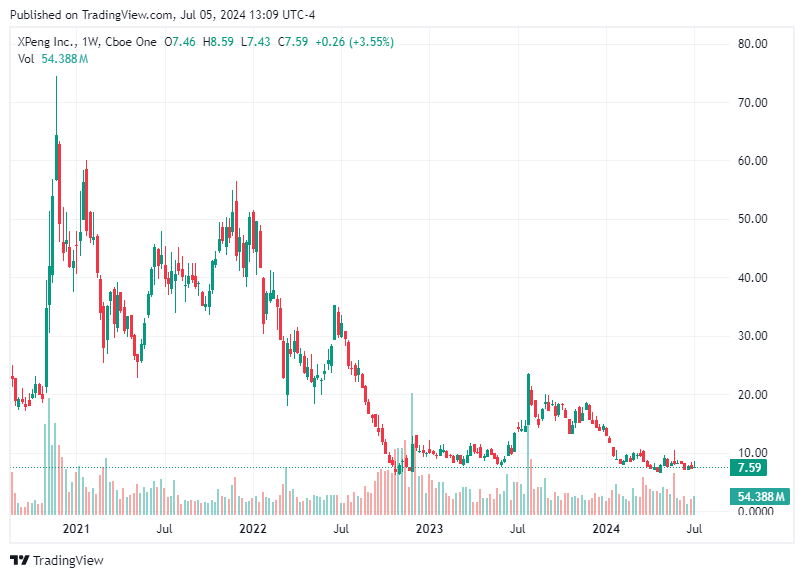European Union Confirms Tariffs on Chinese Electric Vehicles
EU Confirms Tariffs on Chinese-Made Electric Vehicles.

Disclaimer: The information provided in this article is for general informational purposes only and is not intended as commercial or promotional content. The perspectives shared reflect the official stance of the European Union and other stakeholders involved.
Real-time information is available daily at https://stockregion.net
The European Union has confirmed its decision to impose additional tariffs on electric vehicles (EVs) manufactured in China, a move set to reverberate through the automotive industry and potentially escalate trade tensions between the two economic powerhouses. This decision, which was expected by many observers, marks a shift in the EU's trade strategy and raises questions about the future of EU-China economic relations.
The European Commission finalized its decision after a comprehensive nine-month investigation into the subsidies received by the Chinese electric vehicle sector. The investigation revealed extensive state support throughout the entire production chain of battery electric vehicles (BEVs), spanning from the extraction of raw materials to the delivery of final products to the European market. This financial backing has allowed Chinese BEV manufacturers to offer their vehicles at lower prices compared to their European counterparts.
According to the European Commission, these subsidies have led to a considerable increase in imports of Chinese-manufactured BEVs. Market share data indicates a sharp rise from 3.9% in 2020 to 25% by the end of 2023. This influx of low-cost imports poses a "threat of economic injury" to the European automotive sector, potentially jeopardizing more than 12 million direct and indirect jobs across the continent.
Effective from July 5, 2024, the newly imposed tariffs will vary based on the parent company, annual turnover, and the estimated level of subsidies received. These tariffs will be added to the existing 10% rate on Chinese vehicle imports. The specific tariff rates are as follows:
BYD: 17.4%
Geely: 19.9%
SAIC: 37.6%
Other cooperating BEV producers, including Tesla and BMW: 20.8%
Non-cooperating BEV producers: 37.6%
Initially, these measures will be provisional, with customs authorities requiring bank guarantees rather than cash payments from Chinese exporters. As a result, European consumers may not immediately feel the financial impact of these tariffs.
Political Landscape and Member State Reactions
The introduction of these tariffs has ignited a political debate within the European Union. A non-binding vote by member states will take place in two weeks to gauge the political climate. The tariffs will remain in effect until a final decision is reached in four months. During this period, the proposal could be blocked if a qualified majority—representing 15 member states and 65% of the EU population—opposes it.
Germany and Hungary are expected to lead the opposition. Germany, known for its robust automotive industry and extensive trade ties with China, has expressed concerns through the German Association of the Automotive Industry (VDA). The VDA contends that tariffs are not an appropriate measure to enhance competitiveness and could trigger a "lose-lose situation" for both sides. They are particularly worried about the implications for joint ventures, such as those involving Volkswagen and General Motors with SAIC. In contrast, France and Italy are in favor of the additional tariffs. Their support suggests that the upcoming vote could be highly contentious, with significant political maneuvering expected in the lead-up to the decision.
Given the high stakes, there is widespread concern about potential retaliatory measures from China. Beijing has a history of responding decisively to trade actions perceived as unfair, and the imposition of these tariffs could provoke a similar reaction. Such retaliation could target European exports, further complicating the economic landscape and affecting industries beyond automotive manufacturing. China's Ministry of Commerce has already indicated that the country views the EU's decision as a form of protectionism. Chinese officials argue that the tariffs are unjustified and that the subsidies in question are consistent with international trade rules. This rhetoric suggests that Beijing is prepared to defend its policies vigorously, both in diplomatic discussions and potentially through the World Trade Organization (WTO).
Seeking Diplomatic Solutions
Despite the looming threat of a trade war, there remains a window for negotiation. Brussels and Beijing are set to engage in discussions aimed at finding a solution that could prevent the permanent enforcement of these tariffs. These talks will occur at both political and technical levels, with the goal of addressing the underlying issues without resorting to punitive measures. Diplomats and trade experts on both sides will need to navigate a complex web of economic interests and strategic considerations. For the European Union, the challenge lies in protecting its domestic industries while maintaining a stable and cooperative relationship with one of its largest trading partners. For China, the priority will be to safeguard its export markets and preserve the competitive edge of its burgeoning EV sector.
The decision to impose tariffs on Chinese-made BEVs has far-reaching implications for the global automotive industry. As the market for electric vehicles continues to grow, competition among manufacturers is intensifying. The EU's protective measures could influence strategic decisions by carmakers, potentially reshaping supply chains and investment patterns. European manufacturers may seek to enhance their competitiveness through increased innovation and efficiency, possibly accelerating the development of new technologies and production methods. At the same time, Chinese companies might explore alternative markets or invest in local production facilities within the EU to circumvent the tariffs.
The tariffs could affect consumer behavior, particularly if the cost of Chinese-made BEVs rises . European consumers, who have increasingly embraced electric vehicles, may face reduced options or higher prices, which could slow the transition to greener transportation solutions.
The European Union's decision to impose additional tariffs on Chinese-manufactured electric vehicles marks a pivotal moment in international trade relations. While intended to protect European industries from subsidized competition, the move carries the risk of escalating tensions and provoking retaliatory measures. The coming months will be crucial as member states deliberate on the final implementation of these tariffs and as Brussels and Beijing seek to negotiate a resolution.
Disclaimer: The information provided in this article is for general informational purposes only and is not intended as commercial or promotional content. The perspectives shared reflect the official stance of the European Union and other stakeholders involved.
Real-time information is available daily at https://stockregion.net


